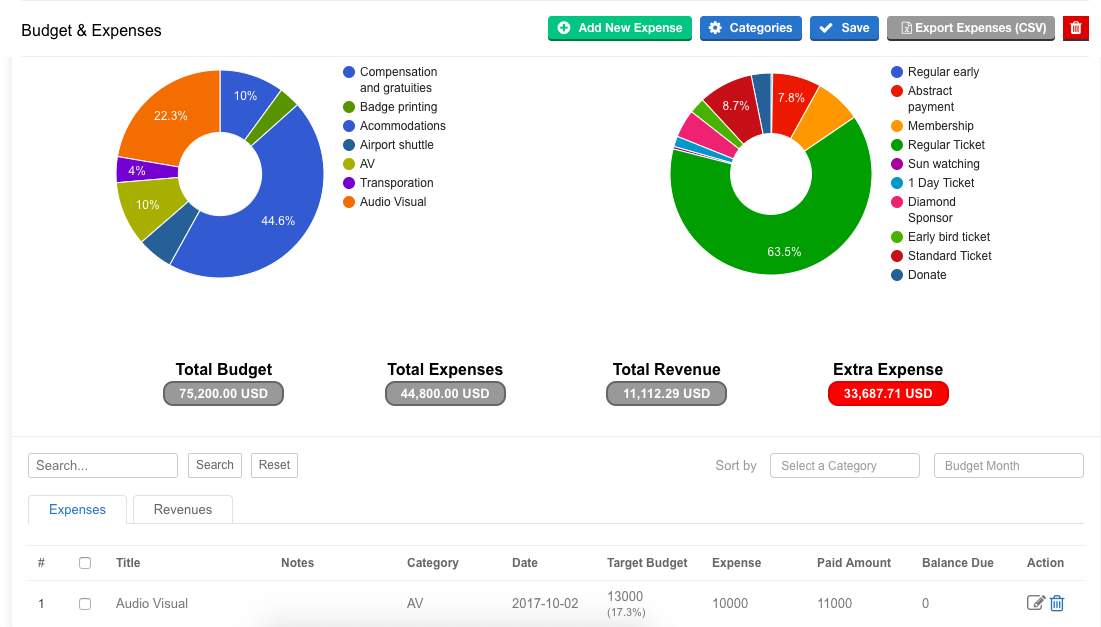A conference would be perfectly organized and executed on the outside as if everything was running on clockwork. Behind the scenes of such flawless academic events lies a lot of planning and forecasting, including some pretty complicated financial budgeting.
Preparing an event budget can leave you stumped at times, especially when it’s your first one. There are many things that need to be considered during budgeting, including the cost that it will incur and how that cost is relevant to the conference’s basic proceedings that you had in mind.
But, here are some easy-to-follow steps that you can use to quickly and effectively draw up a concise budget for your event planning convenience.
☑ #1 Identify all the possible costs
The first thing you need to do is, drum roll, identify all the costs of planning and executing your conference. From the event venue booking, catering, logistics right up to all the finer details that you need and even a tad bit of advertising, you’ll need to anticipate where these costs would come from and sort of rate them according to how essential these things are to your event. This way, you’ll only be spending on the things you need to ensure your conference is a success and keep the frilly expenditures at bay.
☑ #2 Research market prices
For every cost you have on your rough list, find out the market prices for the services, venues, or materials you need. Google is an excellent source of options, and you’re only a phone call away from a quote. Be sure to spend quite a bit of time on this; there will always be an offer that’s much better than the last one if you’re willing to look just a little bit more diligently. Aside from actually going out and getting real-time prices, you can always refer to any previous event budget, especially if you’re looking at an eyeballed budget for the time being.
☑ #3 Look for the best deals
Of course, when it comes to budgeting, the main goal is to spend as little as we can, and have the best of the best for your conference. Seek vendors who provide special package deals or event planner discounts and try to see if their package deals fit into your event needs. Besides that, check with previous event planners and see if they have any vendor contacts you can make do with. Usually, such referral contacts come with a nice discount on the things that you’ll need.
☑ #4 Finalize your vendors and costs
This is where 90% of your budgeting efforts will go into. After you have a list of quotes from your vendors and all the costs that you will incur throughout your conference, it’s time to pick out the best ones that suit your needs. At this stage, it is also quite normal for you to go back out into the market to search for cheaper alternatives for some of your budget lines, so don’t be shy to do so. In some cases, you can even decide to cut out a few things that may seem redundant, so do go ahead with those, you’re not being stingy, rest assured.
☑ #5 Create a budget spreadsheet
Once you have all the values that you need, it’s time to put them into an organized format. Most seasoned event planners get some help from spreadsheet software such as Excel and Google Sheets. These tools come with built-in formulae that can help make calculating costs and budgeting an absolute breeze. A basic budget spreadsheet would have these necessary entries; items, description, estimated cost, actual cost, total cost, and total income/allocation, to see how much you have to work with.
Pro tip: Check out Dryfta Budget & Expenses Tool, a simple event budgeting tool that makes it easy to enter your expenses and revenues with the option to auto-populate revenues from your Dryfta ticketing platform.
☑ Bonus Tip : 15% Additional Budget
You may be wondering why we’ll need additional budget allocation since great budgeting often never requires such things. The truth is that, as perfect as your budget may be on paper, there are some things that you may never expect, like a sudden price hike or a sudden cancellation, even a last-minute change to your venue. And to be prepared for such scenarios, it’s always safer to have about 10% – 15% additional budget, safely stashed away.
With this step-by-step guide, you’d be well on your way to effectively budgeting for your upcoming conference and even any other events that you may have had in mind for the future, even.
Always remember that the best budgeting is when you get the best bang for your buck, and don’t be afraid to look for people who can offer you the best deals for services., without compromising the quality of the items that you had in mind for your conference. Best of luck with your event budgeting!
Free Resources:
Microsoft Office Official Template for Event Budgeting
Event Budget Workbook and Conference Planning Worksheet
Invoice Generator






